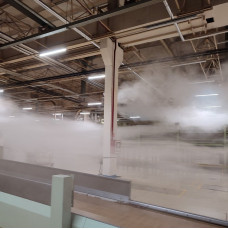Your shopping cart is empty!
Fumigation
Fumigation (from latin fumigare - fumigate, smoke) is a process of pest and plant diseases agent elimination by poisoning them with toxic vapors or gases (or fumigants). Fumigation is carried out on such objects as railcars, ships, grain elevators, warehouses, containers, goods of animal origin and phytogenous goods (cereal crops, legumes, cocoa, peanuts, coffee, tobacco, wood, nuts, dried fruits, etc.). Fumigants usage is effective for most insect extermination, since they affects insects' respiratory tracts. Nonetheless, releasing fumigant gas is not possible on any object, since this procedure requires the premises to be sealed to the maximum in order for the gaseous substance, which is being released from the fog generator to completely fill all the space.
Our Company offers exclusive fumigation methods for treating foodstuffs, tobacco, tea and nuts using plates and strips produced by Detia Degesch German trust. One DEGESCH Plate weighs 117 grams and contains 33g (28%) of magnesium phosphide. The active components are packed in inactive plastic bags that form a plate, which is covered with waterproof paper on both sides. As soon as the aluminium foil bag is removed, the outgassing of phosphine begins in 30 to 60 minutes after exposure to atmospheric air. The process dynamics depends on air humidity and temperature. Phosphine is efficacious against all the agricultural products pests regardless of the stage of their development, as well as rodents that penetrate from outside. The gas has a high penetrating property, it diffuses rapidly through all packaging materials and even sealed goods. DEGESH Plates are easy to use, they do not contact the products directly and leave no residue.


